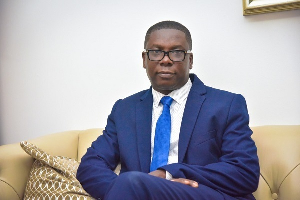For the past several years, I have read a lot of articles about the negative effects of brain drain on poor countries, especially those of Sub-Saharan Africa. I have also read speeches given by national leaders to graduates of various key professions urging them, encouraging them, begging them, to “be patriotic” and stay behind to help their country. In spite of all these calls and urgings, the professionals continue to leave the developing countries for greener pastures elsewhere. We need to sit down and think about alternative ways of dealing with this “problem” of brain drain. Could it be that we are wrong in our assessment of the issues involved in this so called brain drain? Could it be that in fact what we call brain drain is really brain opportunity? It is not always that swimming hard against the current is the virtue. In some instances, the virtue lies in swimming smoothly and easily with the current, and not against it. This is what I mean.
A closer look at the demographics of some western countries, particularly the United States and some European countries, reveals that the populations of these countries are aging very fast. Here in the United States, it is projected that the baby boomers are going to retire en mass and that their health care needs will only grow as the years go by. In fact the health care profession is expected to remain one of the fastest growing professions in the next fifty or so years. Ghana needs to position itself to take advantage of trends like this. I present below a simple model that I think will reach equilibrium with very positive results.
Instead of bemoaning the exodus of our healthcare professionals to the United States and Europe, we should actually encourage it big time! We should promote it and make it easier for our healthcare graduates to obtain jobs in the advanced economies. We should make it more formal. We should even advertise it on the national stage. I know some of you might be thinking that I am a fool. Some may even be thinking that I am not patriotic. Far from these! I am actually an individual who loves Ghana greatly and thinks a lot about this beloved country. However, I am willing to think outside the box and remove impulsive emotions from my paths to solutions. I propose the establishment of a “Bureau of Healthcare Professionals” in Ghana. This Bureau should be staffed with qualified individuals of proven integrity. Their task will be to work with hospitals and other health care delivery agencies in the advanced economies and help meet their health care staffing needs. The same Bureau will help process the documents of Ghanaian nurses, doctors, pharmacists, and other highly needed health care professionals who will then leave Ghana to work in these advanced economies.
The Bureau will sign an agreement with the United States government and the governments of the other advanced countries that a certain percentage (say 20%) of the salaries of our health care exports will be withheld and deposited into the Bureau’s account directly. This arrangement will be public knowledge. Before any professional leaves Ghana, he/she will sign the agreement that 20 percent of his/her salary will be withheld and sent to the Bureau. For example, a Registered nurse “exported’ to California and making $80,000 per year will actually have an “After-Bureau” or “After-Ghana” salary of $64,000. We could put a cap on the number of years a professional has to pay these “fees”. For example, it could be 5 years or 10 years. I believe this can work if we sit down and fill in the details of government to government arrangements and also arrangements with the hospitals, nursing homes, and other healthcare agencies in the advanced economies.
Now, what do we do with the “fees” withheld and transferred into the Bureau’s account? A portion of the total amount collected will be used to boost the salaries of the healthcare professionals who stay home in Ghana. A portion will also be used to train more of these professionals in Ghana, so more of them can be exported to the advanced economies. As the number of health care professionals exported to the advanced countries increase, so will the amount of money withheld from the salaries and transferred to the Bureau. The salaries of the healthcare professionals who stay home to work will keep increasing and the health care courses will become more and more competitive as applications into the departments that train these professionals soar. This will increase the quality of the healthcare professionals coming out of our universities to levels much higher than the already high levels we currently have. It will not be long before we hear hospitals and other health care delivery agencies in the United States and Europe making references to the high quality of “Ghanaian doctors” and “Ghanaian nurses” and making high demands for them.
As time progresses, the salaries of the health care professionals who choose to stay home in Ghana and work will increase until it becomes a significant fraction of what their counterparts in the western countries receive. For example, if the model is implemented well, I can envisage a nurse making (say) $36,000 in Ghana compared to his/her colleague in the United States making (say) $64,000. If one factors in the cost of living differences between Ghana and the United States, and the fact that most Ghanaians place a premium on living in Ghana (all other things being equal), one might conclude that those two salaries are comparable and the system will be in equilibrium. At that point, we will have enough healthcare professionals staying home in Ghana to work and enjoying high standards of living.
In the foregoing, I have used the health care profession for my illustrations but there is no reason why we should limit the discussion to health care. Education is another area we can capitalize on to realize gains similar to what I have described above. Many states in the United States are in dire need of Mathematics and Science teachers, for example. We ca set up a similar Bureau or set up only one Bureau of Highly Skilled Professionals to cater to all professions.
The world is changing and I believe that developing countries need a new paradigm to take advantage of the changing face of the globe. We need to understand the world in which we live and position ourselves to benefit from the trends that are inevitably going to prevail. In critiquing my proposal, I think it will help if we look at the bigger principle of formalizing the “exporting” of much needed professionals so we can benefit from the comparative advantage we have in the lower costs we have to produce these highly desirable professionals. Although I do not have the numbers, I think it is fairly safe to say that the cost of producing a nurse or a doctor in Ghana is only a fraction of what it takes to produce the same quality nurse or doctor in the United States.
The benefits of what I have outlined above could be tremendous. I know there are challenges to be dealt with if we are to implement the proposal but I think they are surmountable. In the end, I believe we will increase the standards of living of millions of Ghanaians; we will improve our universities and other tertiary education units; and we will carve a niche in the global market place for our citizens. What do you think?















